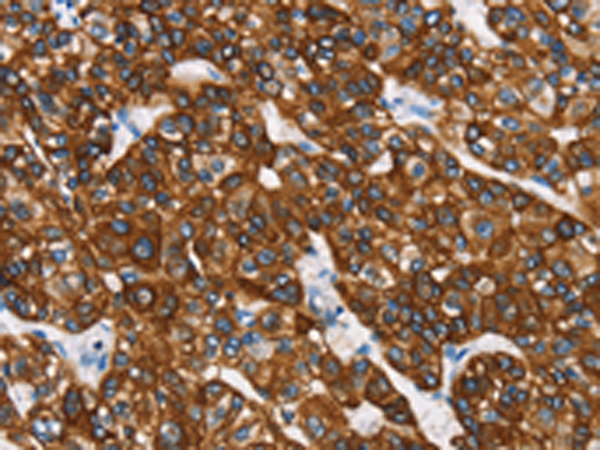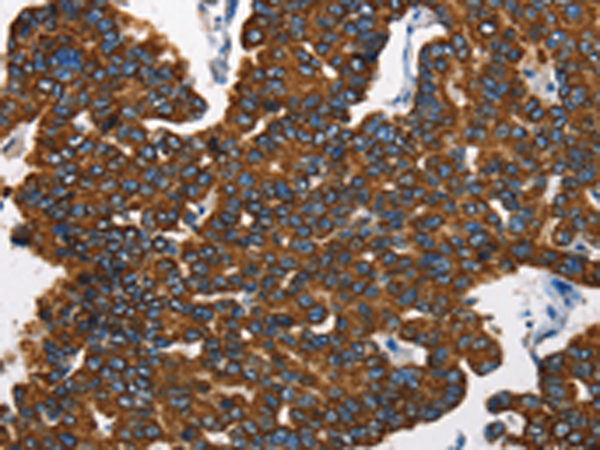

| WB | 咨询技术 | Human,Mouse,Rat |
| IF | 咨询技术 | Human,Mouse,Rat |
| IHC | 1/50-1/200 | Human,Mouse,Rat |
| ICC | 技术咨询 | Human,Mouse,Rat |
| FCM | 咨询技术 | Human,Mouse,Rat |
| Elisa | 1/2000-1/5000 | Human,Mouse,Rat |
| Aliases | K8; KO; CK8; CK-8; CYK8; K2C8; CARD2 |
| Host/Isotype | Rabbit IgG |
| Antibody Type | Primary antibody |
| Storage | Store at 4°C short term. Aliquot and store at -20°C long term. Avoid freeze/thaw cycles. |
| Species Reactivity | Human, Mouse, Rat |
| Immunogen | Fusion protein of human KRT8 |
| Formulation | Purified antibody in PBS with 0.05% sodium azide and 50% glycerol. |
+ +
以下是关于KRT8抗体的3篇参考文献的简要总结(基于公开文献信息整理,具体引用时请核对原文):
---
1. **文献名称**: *Keratin 8 and 19 loss in epithelial cancer cells increases collective cell migration and cisplatin sensitivity through claudin1 up-regulation*
**作者**: Cheung KJ et al.
**摘要**: 该研究利用KRT8抗体检测发现,KRT8/KRT19在癌细胞中的缺失会通过上调紧密连接蛋白Claudin1促进集体迁移,并增强对化疗药物顺铂的敏感性,提示KRT8表达可能与肿瘤侵袭性和耐药性相关。
2. **文献名称**: *Keratin 8 phosphorylation regulates its reorganization during hepatocyte stress and Mallory-Denk body formation*
**作者**: Strnad P et al.
**摘要**: 通过KRT8抗体结合磷酸化特异性分析,揭示KRT8磷酸化在肝细胞应激(如酒精性肝病)中的动态变化,及其与Mallory-Denk小体形成的关联,为肝纤维化病理机制提供新见解。
3. **文献名称**: *Aberrant keratin 8 expression in human prostate cancer cells correlates with a poor prognosis*
**作者**: Zhao J et al.
**摘要**: 研究利用KRT8抗体进行免疫组化分析,发现前列腺癌细胞中KRT8的异常高表达与患者预后不良显著相关,提示其可能作为前列腺癌进展的生物标志物。
---
**注**:以上内容基于领域内相关研究概括,实际文献可能存在差异。建议通过PubMed或Google Scholar检索具体标题获取原文信息。
Keratin 8 (KRT8) is a type II intermediate filament protein encoded by the *KRT8* gene, primarily expressed in single-layer epithelial cells of tissues like the liver, pancreas, intestines, and glandular organs. As part of the keratin family, KRT8 pairs with type I keratins (e.g., KRT18) to form cytoskeletal networks that maintain cellular integrity, mechanical stability, and resistance to stress. KRT8 antibodies are immunological tools designed to detect this protein, widely used in research and diagnostics.
In pathology, KRT8 antibodies help identify epithelial-derived cancers (e.g., adenocarcinomas) and distinguish them from non-epithelial tumors. They are also employed to study epithelial injury, regeneration, and diseases such as inflammatory bowel disease, liver fibrosis, and pancreatitis. KRT8 expression is often dysregulated during epithelial-mesenchymal transition (EMT) in cancer metastasis. However, its detection can vary depending on tissue fixation methods, necessitating antibody validation for specific applications (e.g., immunohistochemistry, Western blot).
Recent studies explore KRT8's role beyond structural support, including apoptosis regulation, signal transduction, and organelle organization. Antibodies against post-translationally modified KRT8 (e.g., phosphorylated forms) further illuminate its dynamic functions in stress responses. Despite its utility, interpreting KRT8 antibody results requires caution, as overexpression or mutations may correlate with both protective and pathogenic outcomes in tissue-specific contexts.
×